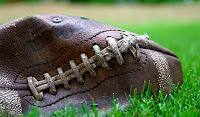 By this point, even people who couldn’t give a flying pigskin about the National Football League are at least vaguely aware of New England pretty boy Tom Brady’s fondness for underinflated balls.
By this point, even people who couldn’t give a flying pigskin about the National Football League are at least vaguely aware of New England pretty boy Tom Brady’s fondness for underinflated balls.
The short version: NFL Commissioner Roger Goodell suspended Brady for the first four games of the 2015 season, finding he had “participated in a scheme to tamper with the game balls after they had been approved by the game officials for use in the AFC Championship Game” and “willfully obstructed the investigation by, among other things, affirmatively arranging for the destruction of his cellphone knowing that it contained potentially relevant information that had been requested by the investigators.” Boston fans cried “witch-hunt,” and the NFL Players Association asked a Federal Court to intervene on Brady’s behalf.
In early September, the NFLPA got its wish when the United States District Court for the Southern District of New York vacated the league’s sanctions against its superstar quarterback. The suspension was lifted, Boston fans rejoiced, and Brady didn’t miss a game of the 2015 season. The District Court’s decision essentially replaced Goodell’s reasoning with its own, finding that the arbitration process as a whole deprived Brady of fundamental fairness.
The NFL appealed, and now the suspension is back in effect for the upcoming 2016 season. Yesterday, the United States Court of Appeals for the Second Circuit reversed the District Court, making clear that its 2-1 ruling was not addressing questions of “fairness” or whether Brady actually had a hand in deflating any game balls: “We are not . . . authorized to review the arbitrator’s decision on the merits despite allegations that the decision rests on factual errors or misinterprets the parties’ agreement, but inquire only as to whether the arbitrator acted within the scope of his authority as defined by the collective bargaining agreement.”
In this case, it appears that the District Court was taken aback by the NFL’s investigative and disciplinary procedures and agreed with the NFLPA’s contention that the arbitration process wasn’t “fair.” The Second Circuit’s response: “So what?” Brady was punished within a framework to which the NFLPA had agreed. If the process wasn’t “fair,” it means the NFLPA needs to negotiate a better Collective Bargaining Agreement. It does NOT mean a Federal Court needs to step in and meddle in arbitration.
Attorney Marc Lopez doesn’t have a lot of sympathy for Tom Brady, but he would like to take this opportunity to remind everyone that the Supreme Court of the United States has held that the Fifth Amendment’s privilege against self-incrimination isn’t just for guilty people—it also “serves to protect the innocent who might otherwise be ensnared by ambiguous circumstances.” Always plead the Fifth when the police ask you questions. If you are being investigated by your employer, or even by the NFL, call Attorney Marc Lopez to figure out what you should or should not say so that a simple work investigation does not turn into a criminal investigation. If investigators are looking to talk to you, then you need to talk to Attorney Marc Lopez. Call him at 317-632-3642 for a free consultation.



